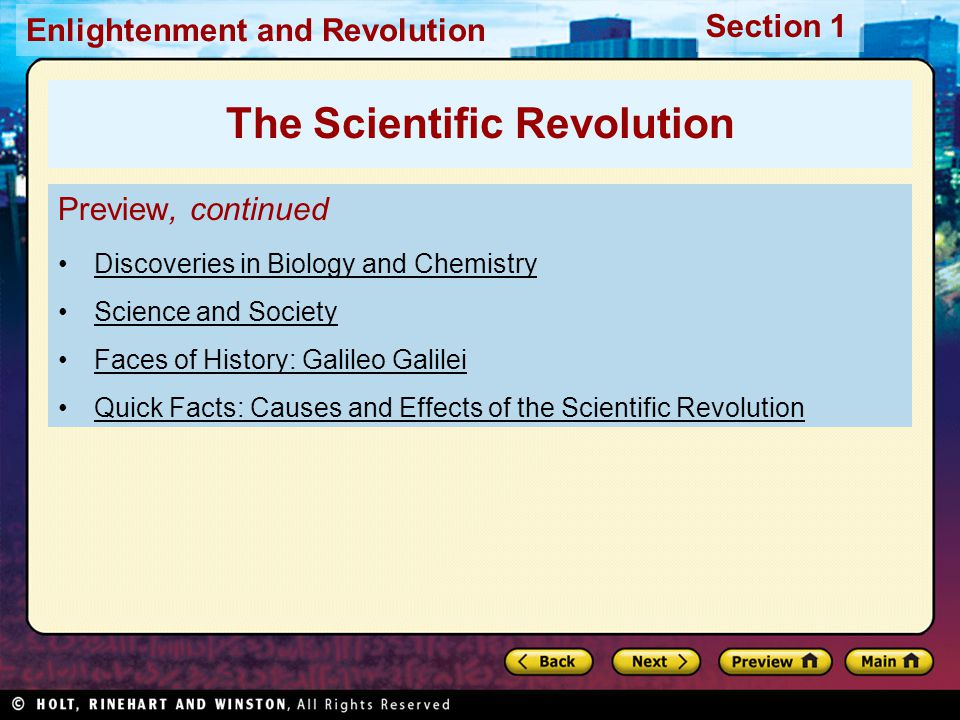
The Scientific Revolution was a series of events that marked the emergence of modern science during the early modern period when developments in mathematics physics astronomy biology including human anatomy and chemistry transformed the views of society about nature. Until the scientific revolution it was very natural to see such goals in nature.

The scientific revolution to which you refer is meant to indicate the great first flowering of experimental methods that can variably be assigned to the end of the Renaissance or to the following century I presume.
Cause and effect of the scientific revolution. The Scientific Revolution was caused by a shift in the way people viewed the world and its future. These paradigm shifts included the willingness to accept our own ignorance an emphasis on math and observation the desire for imperial dominance and the new belief in progress. Well cover how these causes of the Scientific Revolution changed the.
The scientific revolution caused the Medieval Universities to provide frame world for new science. The renaissance stimulated by science rediscovering ancient mathematics and supporting scientific investigations. The scientific communitys primary goal was to expand knowledge.
The Scientific Revolution championed by Copernicus the Polish mathematician and astronomer born in 1473 changed the concept of the relationship between Man and Nature. At the beginning of this. The increased emphasis placed on experimentation and empirical knowledge during the Scientific Revolution caused many philosophers and scientists.
The impact of the scientific revolution was that experiments became more controlled while scientists were able to discover new ways of finding whether a particular belief was true. The communication involved in the era allowed scientists to collaborate with other professionals through all disciplines. They took these ideas used combined.
The Scientific Revolution occurred in the sixteenth and seventeenth centuries leading to the Enlightenment. In the sixteenth century Copernicus stated. The claimed Scientific Revolution in Europe in the Fifteenth and Sixteeenth centuries is ethnocentric propaganda not reality.
Copernicus recycled the heliocentric theory of Aristarchus of Samos 1500 years earlier. Newton developed the new Indo-Arabic mathematics to. Scientific Revolution Cause And Effect Essays and Research Papers Scientific Revolution Cause And Effect.
The effects of the Scientific Revolution on philosophy from 1550-1715 Zoe. Cause and Effects of the French Revolution. Have you ever wondered what the causes and effects were of the.
The Scientific Revolution is generally understood as the period in the 16th and 17th centuries when reason and knowledge replaced religion and superstition. The most significant effect was the birth of modern scientific thought. The ripple of effects from this is too great to catalogue.
And while some historians may argue that the term Scientific Revolution was a bit far-fetched due to the fact of what was being revolutionized being unknown I would argue that societys understanding of time space and human significance were just a few of the headlines that were illuminated throughout The Scientific Revolution. The Scientific Revolution was a major event that changed traditional beliefs in Europe. People had accepted old theories that the Sun and all the other planets revolved around the earth.
Scientific Revolution Cause And Effect Essays and Research Papers The Scientific Revolution. Baroque Art as a distinct style emerged during the 17th century. It ran in parallel with.
Scientific Revolution and How It Effects Modern Science. The Scientific Revolution refers to historical. The Scientific Revolution was a series of events that marked the emergence of modern science during the early modern period when developments in mathematics physics astronomy biology including human anatomy and chemistry transformed the views of society about nature.
The scientific revolution encouraged people to think for themselves analyze society and reconsider previous beliefs about the world. This led to a diminished capacity of politicians and religious leaders to influence the thoughts and behaviors of people. The scientific revolution to which you refer is meant to indicate the great first flowering of experimental methods that can variably be assigned to the end of the Renaissance or to the following century I presume.
Otherwise we have had m such. The growing flood of information that resulted from the Scientific Revolution put heavy strains upon old institutions and practices. It was no longer sufficient to publish scientific results in an expensive book that few could buy.
Information had to be spread widely and rapidly. The final cause was the aim or goal of something. Thus the final cause of rain was to let plants grow.
Until the scientific revolution it was very natural to see such goals in nature. The world was inhabited by angels and demons spirits and souls occult powers and mystical principles.